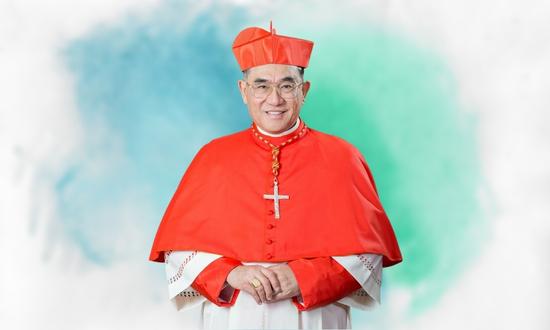Kovithavanij: dialogue with Buddhism and missionary Church in the magisterium of the Thai cardinal
The Archbishop Emeritus of Bangkok has led the Thai Catholic Church with a focus on mission and inter-religious dialogue. He had promoted the foundation of the Thai Missionary Society - supported by PIME missionary Fr. Adriano Pelosin - closeness to the poor and openness to the Buddhist majority. He will be among the cardinal electors at the next Conclave.
Rome (AsiaNews) - There are two main directions that have marked the compass of the teaching of Cardinal Francis Xavier Kriengsak Kovithavanij, Archbishop emeritous of Bangkok, Thailand: the focus on the missionary Church and the promotion of dialogue with Buddhism (which about 95% of the population practices). Father Adriano Pelosin, a PIME missionary originally from Loreggia (Padua, Italy), who has been in Thailand since 1978, speaks about this to AsiaNews. “We have been friends for over 40 years, and meeting him was providential for the growth of the Thai Missionary Society, which has sent priests to Cambodia, Laos, and Taiwan.”
Kovithavanij is one of the 133 cardinal electors who, starting from Wednesday, May 7, will participate in the Conclave in the Vatican to elect the new pope. He represents that “periphery” dear to Pope Francis, which has also been highlighted by the creation of cardinals from Asia. In fact, Bergoglio visited Thailand in November 2019, marking a historic visit after that of Saint John Paul II in 1984. It was at the Cathedral of the Assumption in Bangkok that hundreds of faithful participated in the Mass celebrated together with Cardinal Kovithavanij. “Be assured that you are the present and the future of the Church and Thai society,” Pope Francis said addressing the youth.
Cardinal Kovithavanij, who turned 75 last June, was born in Ban Rak, Archdiocese of Bangkok, in 1949. He was trained at the Saint Joseph Seminary in Sampran and studied philosophy and theology at the Pontifical Urban University – from 1970 for six years – residing at the Urban College in Rome. He was ordained a priest in 1976. He is the second cardinal in the history of the Thai Church, after his predecessor on the archiepiscopal chair of Bangkok, Michael Michai Kitbunchu. Last June, due to reaching the age limit as stipulated by the Code of Canon Law, Pope Francis accepted his resignation. At the same time, his role as president of the Thai Bishops’ Conference ended. Archbishop of the capital since 2009, he was created a cardinal by Bergoglio in 2015.
Continuing to talk about the missionary institute, Father Adriano Pelosin adds that its foundation was also facilitated and desired by Cardinal Kovithavanij. “It was established as an association of priests for the mission, dependent on the Archdiocese of Bangkok. He was very instrumental in the founding of this missionary institute, which was wanted by the Thai Bishops’ Conference already in 1986. Now, there are about twenty missionaries, mainly working in the north of Thailand, among the mountain tribes,” he says. The Archbishop emeritous of Bangkok also helped provide a place for the missionary entity: the church dedicated to Saint Mark in Pathum Thani, a central region of Thailand. “Many people in the slums know us: about 200 young people come to play and do activities at the church,” he adds. “Kovithavanij wanted every parish to have these activities. He was always close to me for anything; we spoke very openly.”
The magisterium of Cardinal Francis Xavier Kriengsak Kovithavanij is inevitably set in the Thai context, where the largest Catholic community resides in Bangkok, counting about 100,000 faithful. “The dioceses are attentive to the Catholic faithful, the priests are very good, but they are not very open to evangelization, they struggle to open up to new communities,” explains Pelosin. “I’m talking about the poor, Buddhists: this is certainly a cultural limit as well. This is the challenge of the Church in Thailand: to find ways to communicate the beauty of the incarnated faith, as Pope Francis taught us, through acts of goodness, mercy, hospitality, and openness toward the marginalized.” “Behind the skyscrapers of Bangkok, there are many poor people, miserable, slaves in every sense,” he continues, “who need to be looked at, seen, and considered. The Catholic Church has everything to offer, it lacks nothing, but it is closed in itself. Opening the doors: this is the challenge for the local Church.”
Kovithavanij received episcopal ordination on June 2, 2007, from his predecessor in Bangkok, Kitbunchu. As Metropolitan Archbishop of the capital, he participated in the Synod of Bishops in 2012: on that occasion, his intervention focused on the role of ecclesial communities in dialogue with Buddhist communities. “He has helped a lot in the development of evangelization,” adds Father Adriano Pelosin, speaking of Cardinal Kovithavanij, whom he considers a “great friend.” “He strongly urged diocesan priests to open new missions around their parishes, to reach out to Buddhists, especially the poor, always encountering many difficulties and challenges.”
As a promoter of dialogue with regions in Southeast Asia, the Archbishop emeritous has thus facilitated relations with the religious majority of his country. On the evening of April 29, the Thai Buddhist community commemorated the late Pope Francis with a memorial service at the Wat Pho temple in Bangkok. This event confirmed the respect that exists between Catholics and Buddhists, which has grown over time and has undoubtedly been nurtured and facilitated by Kovithavanij; both groups participated in the ceremony, including high-ranking members of the Thai Catholic Church, such as Monsignor Vira Arpondratana, now Archbishop of Bangkok. “Every time, he welcomed me with the warmth of an old friend,” said Somdet Phra Maha Thirachan, abbot of the Yannawa temple, remembering Bergoglio.







.png)










